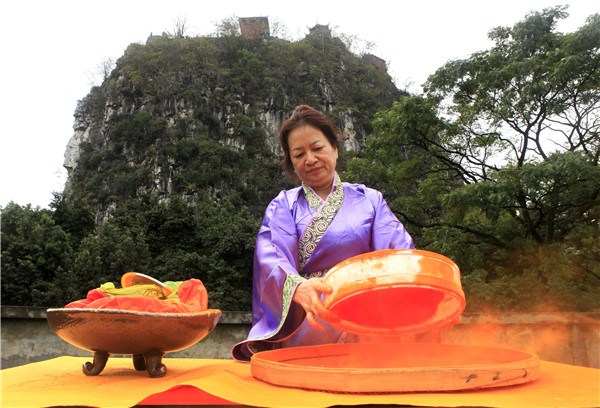Rubbing the right way
 0 Comment(s)
0 Comment(s) Print
Print E-mail China Daily, March 10, 2016
E-mail China Daily, March 10, 2016
|
|
|
Wang Jisheng's assistant Zhou Hong practice the ancient stone rubbing art in Guilin, Guangxi Zhuang autonomous region. (Photo by huo Yan / China Daily) |
Wang went to a Taoist temple in Jiangxi province in 2005, and became a Taoist.
"In ancient art there is always a religious pivot. The dilemma for modern art is the people have too many ideas but cannot find the pivot any more," says Wang.
Everything originates from five elements in the yin and yang world-gold, wood, water, fire and soil-according to Taoist doctrine.
Wang says he draws his inspiration from Taoist thought.
Wang has a pigment colorist, Zhou Hong, as his assistant.
Zhou, who is an expert at making mineral pigments, learned the skills from thangka makers in the Potala Palace in Lhasa.
"They have many old ways of extracting and purifying colors from minerals and plants.
The colors are bright, environmentally friendly and last longer than today's chemicals," says Zhou.
"Wang's stone rubbing has color requirements similar to that of the thangka masters in Lhasa."
Both Wang and Zhou wear Chinese traditional silk clothes when they work.
They look serious and extremely focused, and their movements are slow and rhythmic.
Their eyes follow the movements of their hands, and the whole body moves in a harmonious manner.
Their work looks exactly like a kind of taiji on the paper. "My spirit, heart, eyes and hands focus only on the rubbing and the paper," says Wang.
"Behind the thin paper is history. Or my re-creation of it. And in front of it is my soul and reverence."
As Zhou sees it: "There is a whole lot of Oriental etiquette and protocol to follow in practicing the art. Outsiders may think it is too ceremonious.
"But in fact, the process is part of the art. When you really focus on it, the result is not that important. You are in it, and enjoy it. It is your world, where you forget the world."
Wang and Zhou like Jingjiang Palace very much because the mountains, temples, plants, caves and inscriptions are well preserved, creating a quiet atmosphere like nowhere else, where they can practice their art.







